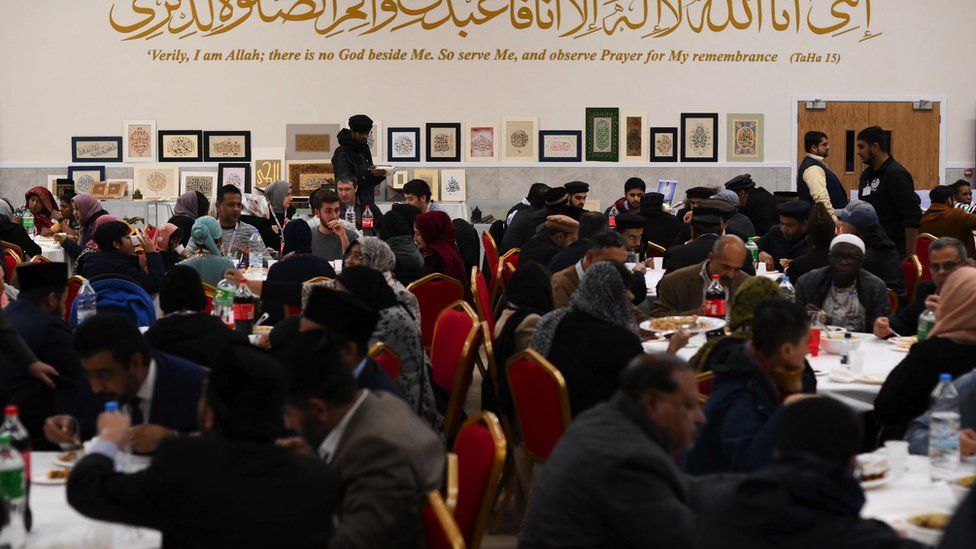ARTICLE AD BOX
 Image source, Getty Images
Image source, Getty Images
The end of Ramadan is marked by a big celebration called 'Eid ul-Fitr'
By Emaan Warraich
BBC News
"You can't have your cake and eat it" is a common political phrase, which has never been more true for Muslim politicians fasting during Ramadan.
During the month of Ramadan, Muslims don't eat or drink during daylight hours in a practice called fasting.
When the sun sets, Muslims break their fast with a meal known as an 'iftar' which is often a large community event.
But with Eid approaching and the end of Ramadan near, how have Muslim politicians felt about balancing politics and faith during this month?
Image source, Getty Images
Image caption,Zara Sultana says the spirit of Ramadan is serving people
The Labour MP for Coventry, Zara Sultana, says Ramadan encourages Muslims to "continue in the pursuit of justice, collectively, in solidarity with each other".
Miss Sultana says that key to her job in politics is the Islamic emphasis on "speaking truth to power" and "holding ourselves to the highest standards possible".
"Working in politics means that there are times that you may feel a sense of despair but the Quran reminds us 'Verily. With hardship comes ease'."
During Ramadan she says it has been "wholesome for many of us Muslim MPs to get together in Parliament to break our fasts together and invite other non-Muslim colleagues along to break bread too".
"The spirit of Ramadan really is in serving people," she adds.
But she admits that it had been challenging when a vote was taking place during the time to break fast, so she had kept food and water on her occasionally.
Image source, UK Parliament
Image caption,Time for reflection is important in politics, says Lord Safraz
One parliamentarian has juggled his daily routine during Ramadan. When at work, Lord Sarfraz has started later in the morning and worked until later in the evening.
The Tory peer adds that in professional environments "the more accommodating employers can be, the better".
Muslims who observe Ramadan receive protection under the Equality Act 2010 from all forms of discrimination. As a result, reasonable accommodations can be considered in the workplace for fasting employees.
The peer - who is a trade envoy for Singapore and previous treasurer of the Conservative Party - also says Ramadan is a great time for "reflection" which is "incredibly important as a parliamentarian".
He says that Ramadan is his favourite time and that "our lives are usually so fast paced, that we don't get to spend enough time together with friends and family. Ramadan provides that opportunity."
Image source, Getty Images
Image caption,UK politics could use more compassion and patience, says Anum Qaisar-Javed
Ramadan is a month where Muslims come together and make immense sacrifice whilst also carrying out charitable acts, Scottish National Party MP for Airdrie and Shotts, Anum Qaisar explains.
She says that by observing Ramadan she can reflect on compassion and patience, which is something that "UK politics could use a lot more of".
During Ramadan her job continues as normal and "there is no room to slow down", she says, which means attending votes "even if they go on until midnight", carrying out constituency visits and meeting constituents at help and advice surgeries.
She says that being able to break her fast with cross-party colleagues or attending an iftar at the Speaker's House reminds her of "just how far we have come as a Parliament in broadening and accepting diversity".
Hamza Taouzzale joined an iftar at Kings College
Westminster's first ever Labour Muslim Mayor, Hamza Taouzzale, points to initiatives like the Ramadan lights in Piccadilly Circus in London, which he said have helped people from all cultures and faiths to celebrate Ramadan.
As mayor, he says he has had some "funny" and "awkward" meetings, where his guests eat as he watches, but adds that people were understanding and positive about him keeping food and water nearby to break his fast whilst working.
Reflecting on an open community iftar he recently attended at Kings College, in London, he says these events can help educate people on what it means to be Muslim and shows Muslims as a "friendly community".
Patience, calmness under pressure and kindness are the lessons Hina Bokhari, a Liberal Democrat and the chair of the London Assembly's economy committee, says Ramadan teaches.
With food and energy prices going up, Ms Bokhari says that the sacrifices Muslims make by not eating and drinking focusses her mind on the less fortunate.
Although campaigning can be draining during Ramadan, she believes it is a "unifying month" and that interfaith iftars "show just how so many of us, from all faiths and none, have in common".
"As a politician you need to be able to relate with our most vulnerable and knowing real hunger and thirst is the most effective way of understanding the need to put others before yourself.
"It's a reboot for Muslims and in some ways a reminder about the importance of good behaviour, which is no bad thing in politics."

 1 year ago
28
1 year ago
28








 English (US) ·
English (US) ·